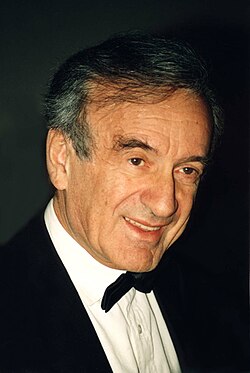Elie Wiesel Quote
Luz Castro And then i explain that the world did know and remained silent. and that is why I swore never to be silent whenever and wherever human beings endure suffering and humiliation. We must take sides. NEUTRALITY HELPS THE OPPRESSOR, NEVER THE VICTIM. SILENCE ENCOURAGES THE TORMENTOR, NEVER THE TORMENTED. Sometimes we must interfere. When human lives are endangered, when human dignity is in jeopardy, national borders and sensitivities become irrelevant. Wherever men and women persecuted because of their race, religion, or political views, that place must- at that moment- become the center of the universe. Elie Wiesel (from his speech when given the Nobel Peace Prize.)
Luz Castro And then i explain that the world did know and remained silent. and that is why I swore never to be silent whenever and wherever human beings endure suffering and humiliation. We must take sides. NEUTRALITY HELPS THE OPPRESSOR, NEVER THE VICTIM. SILENCE ENCOURAGES THE TORMENTOR, NEVER THE TORMENTED. Sometimes we must interfere. When human lives are endangered, when human dignity is in jeopardy, national borders and sensitivities become irrelevant. Wherever men and women persecuted because of their race, religion, or political views, that place must- at that moment- become the center of the universe. Elie Wiesel (from his speech when given the Nobel Peace Prize.)
Related Quotes
About Elie Wiesel
As a political activist, Wiesel became a regular speaker on the subject of the Holocaust and remained a strong defender of human rights during his lifetime, advocating for justice in numerous causes around the globe, including that of Soviet Jews and Ethiopian Jews, South African apartheid, the Rwandan genocide, the Bosnian genocide, the War in Darfur, the Kurdish independence movement, the Armenian genocide, Argentina's Desaparecidos, Nicaragua's Miskito people, the Sri Lankan Tamils, and the Cambodian genocide. He was also an outspoken advocate for Israel and frequently weighed in to support the country during escalations of the Arab–Israeli conflict and throughout the Iran–Israel proxy conflict, while also hosting direct talks to facilitate the Israeli–Palestinian peace process.
Wiesel was a professor of the humanities at Boston University, which created the Elie Wiesel Center for Jewish Studies in his honor. He received a number of awards, including the Nobel Peace Prize in 1986. He was a founding board member of the Human Rights Foundation and remained active in it throughout his life. Wiesel was one of the main figures who spearheaded the establishment of the United States Holocaust Memorial Museum in 1993.
